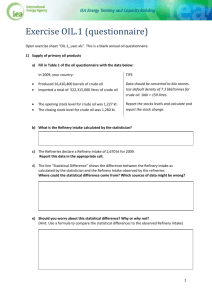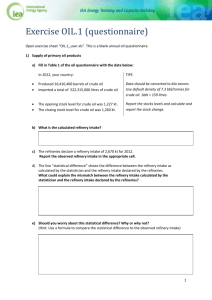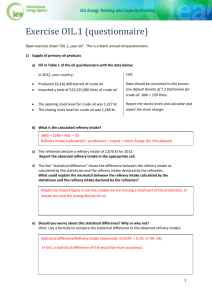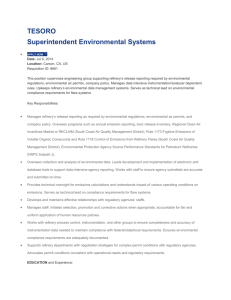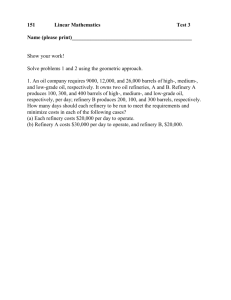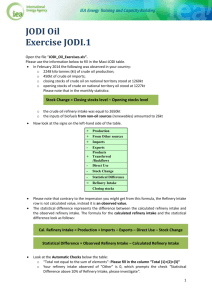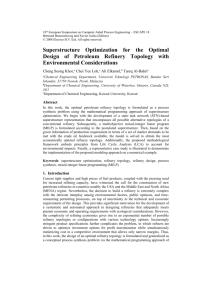Monthly oil exercises
advertisement
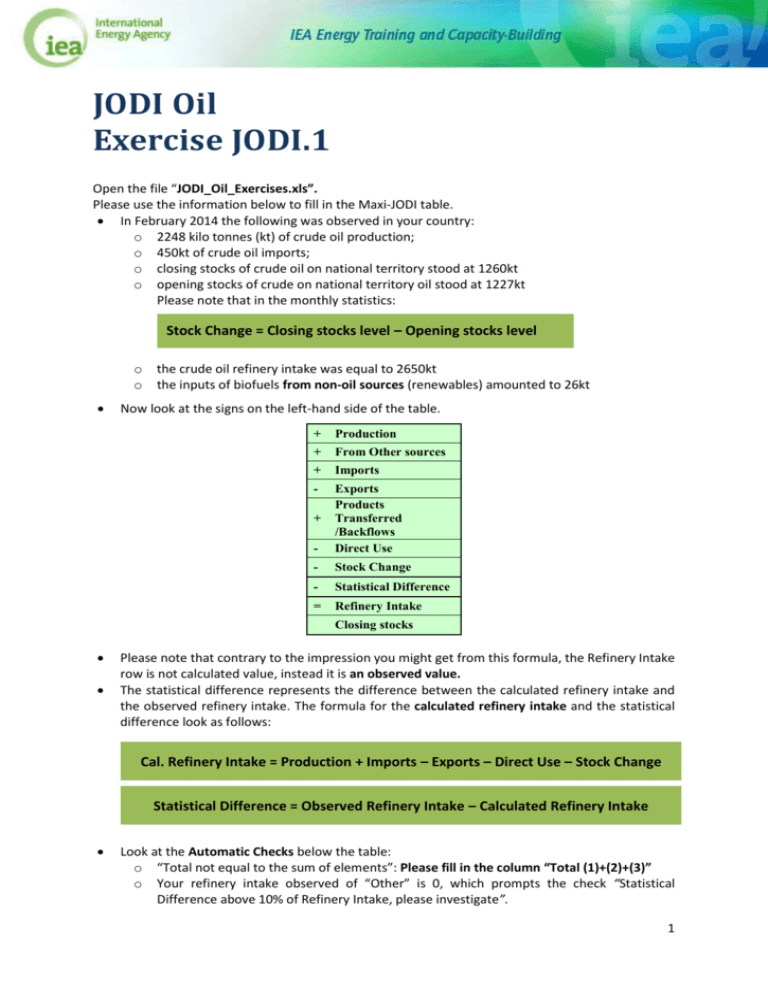
JODI Oil Exercise JODI.1 Open the file “JODI_Oil_Exercises.xls”. Please use the information below to fill in the Maxi-JODI table. In February 2014 the following was observed in your country: o 2248 kilo tonnes (kt) of crude oil production; o 450kt of crude oil imports; o closing stocks of crude oil on national territory stood at 1260kt o opening stocks of crude on national territory oil stood at 1227kt Please note that in the monthly statistics: Stock Change = Closing stocks level – Opening stocks level o o the crude oil refinery intake was equal to 2650kt the inputs of biofuels from non-oil sources (renewables) amounted to 26kt Now look at the signs on the left-hand side of the table. + Production + From Other sources + Imports - - Exports Products Transferred /Backflows Direct Use - Stock Change - Statistical Difference = Refinery Intake + Closing stocks Please note that contrary to the impression you might get from this formula, the Refinery Intake row is not calculated value, instead it is an observed value. The statistical difference represents the difference between the calculated refinery intake and the observed refinery intake. The formula for the calculated refinery intake and the statistical difference look as follows: Cal. Refinery Intake = Production + Imports – Exports – Direct Use – Stock Change Statistical Difference = Observed Refinery Intake – Calculated Refinery Intake Look at the Automatic Checks below the table: o “Total not equal to the sum of elements”: Please fill in the column “Total (1)+(2)+(3)” o Your refinery intake observed of “Other” is 0, which prompts the check “Statistical Difference above 10% of Refinery Intake, please investigate”. 1 Exercise JODI.2 Please fill in the following information in the Maxi-JODI table. In February 2014 the following figures for Refinery Gross Output by product were observed in your country: o LPG: 199kt o Naphtha: 356kt o Gasoline: 576kt o Kerosene (Type Jet Fuel): 391kt o Gas/Diesel Oil: 524kt o Fuel oil: 633kt o Refinery Gas: 5kt o Ethane: 4kt Please, keep in mind that refinery Gas and ethane are part of “Other Products” in MaxiJODI: Check the definition of “Other Products” in the sheet called “Definitions”. In February 2014 the following trade figures were observed in your country: o Import of 100kt of other kerosene o Export of 91kt of jet kerosene. Please, keep in mind that jet kerosene is included in total kerosene. Therefore, the amounts reported under jet kerosene should not be larger than the amounts of total kerosene. Total Kerosene = Jet Kerosene + Other Kerosene Please, fill in the amounts of observed demand for the following products: o LPG: 200kt o Naphtha: 350kt o Gasoline: 576kt o Total Kerosene: 400kt o Kerosene (Type Jet Fuel): 300kt o Gas/Diesel Oil: 524kt o Fuel oil: 633kt o Other Products: 9kt Please fill in the correct amounts in the column “Total Products”. 2 Exercise JODI.3 Please report the following information in the table: 100kt of NGL was produced and used directly (i.e. not in the refinery, but in a gas plant) to produce LPG. Please, keep in mind that this process has to be reported on both sides of the table since it includes primary (NGL) as well as secondary products (LPG). o Start with filling in the amounts of NGL (production and direct use). o Continue with the reporting of the secondary products. Hint: Check the definitions of “Other Products” and of the flow “Receipts” in the “Definitions” tab. You need to show how the amounts of NGL were reclassified into LPG. For that purpose, use the “Interproduct Transfer” row. Please, correct the columns “Total” on both sides of the table. Now look at the calculation of Refinery Losses below the table: (click on the cell “D31” to see the formula). Refinery Losses = Refinery Intake– Refinery Output The automatic check shows the following message: "Reported figures imply a refinery gain. Losses should not be negative". In your opinion, what might be the reason for a negative refinery loss? 3
